《醉翁亭记》原文

环滁皆山也。其西南诸峰,林壑尤美,望之蔚然而深秀者,琅琊也。山行六七里,渐闻水声潺潺,而泻出于两峰之间者,酿泉也。峰回路转,有亭翼然临于泉上者,醉翁亭也。作亭者谁?山之僧智仙也。名之者谁?太守自谓也。太守与客来饮于此,饮少辄醉,而年又最高,故自号曰醉翁也。醉翁之意不在酒,在乎山水之间也。山水之乐,得之心而寓之酒也。
若夫日出而林霏开,云归而岩穴暝,晦明变化者,山间之朝暮也。野芳发而幽香,佳木秀而繁阴,风霜高洁,水落而石出者,山间之四时也。朝而往,暮而归,四时之景不同,而乐亦无穷也。
至于负者歌于途,行者休于树,前者呼,后者应,伛偻提携,往来而不绝者,滁人游也。临溪而渔,溪深而鱼肥。酿泉为酒,泉香而酒洌;山肴野蔌,杂然而前陈者,太守宴也。宴酣之乐,非丝非竹,射者中,弈者胜,觥筹交错,起坐而喧哗者,众宾乐也。苍颜白发,颓然乎其间者,太守醉也。
已而夕阳在山,人影散乱,太守归而宾客从也。树林阴翳,鸣声上下,游人去而禽鸟乐也。然而禽鸟知山林之乐,而不知人之乐;人知从太守游而乐,而不知太守之乐其乐也。醉能同其乐,醒能述以文者,太守也。太守谓谁?庐陵欧阳修也。
中文翻译
环绕滁州的都是山。那西南方的几座山峰,树林和山谷格外秀美。一眼望去,树木茂盛,又幽深又秀丽的,是琅琊山。沿着山路走六七里,渐渐听到潺潺的流水声,看到流水从两座山峰之间倾泻而出的,那是酿泉。泉水沿着山峰折绕,沿着山路拐弯,有一座亭子像飞鸟展翅似地,飞架在泉上,那就是醉翁亭。建造这亭子的是谁呢?是山上的和尚智仙。给它取名的又是谁呢?太守用自己的别号(醉翁)来命名。太守和他的宾客们来这儿饮酒,只喝一点儿就醉了;而且年纪又最大,所以自号“醉翁”。醉翁的情趣不在于喝酒,而在欣赏山水的美景。欣赏山水美景的乐趣,领会在心里,寄托在酒上。
至于太阳的升起,山林里的雾气散了;烟云聚拢来,山谷就显得昏暗了;朝则自暗而明,暮则自明而暗,或暗或明,变化不一,这就是山中的朝暮。野花开了,有一股清幽的香味;好的树木枝繁叶茂,形成一片浓密的绿荫;风高霜洁,天高气爽,水落石出,这就是山中的四季。清晨前往,黄昏归来,四季的风光不同,乐趣也是无穷无尽的。
至于背着东西的人在路上欢唱,来去行路的人在树下休息,前面的招呼,后面的答应;老人弯着腰走,小孩子由大人领着走。来来往往不断的行人,是滁州的游客。到溪边钓鱼,溪水深并且鱼肉肥美;用酿泉造酒,泉水清并且酒也清;野味野菜,横七竖八地摆在面前的,那是太守主办的宴席。宴会喝酒的乐趣,不在于音乐;投射的中了,下棋的赢了,酒杯和酒筹交互错杂;时起时坐大声喧闹的人,是欢乐的宾客们。一个脸色苍老的老人,醉醺醺地坐在众人中间,是太守喝醉了。
不久,太阳下山了,人影散乱,宾客们跟随太守回去了。树林里的枝叶茂密成林,鸟儿到处叫,是游人离开后鸟儿在欢乐地跳跃。但是鸟儿只知道山林中的快乐,却不知道人们的快乐。而人们只知道跟随太守游玩的快乐,却不知道太守以游人的快乐为快乐啊。醉了能够和大家一起欢乐,醒来能够用文章记述这乐事的人,那就是太守啊。太守是谁呢?是庐陵郡的欧阳修呀。
英文翻译
All around Chuzhou are mountains. The peaks in the southwest are especially beautiful, with lush forests and deep valleys. The place that looks lush and exuberant from afar is Langya Mountain. After walking six or seven miles along the mountain path, you can gradually hear the gurgling sound of the stream. The stream flows out between two peaks, and it is the Niangquan Spring. The mountain path winds around, and there is a pavilion standing gracefully above the spring. It is the Drunkard Pavilion. Who built this pavilion? It was the monk Zhixian on the mountain. Who named it? The prefect gave it his own nickname. The prefect and his guests came here to drink. He would get drunk after just a little drink, and he was also the oldest among them. So he called himself the "Drunkard". The Drunkard's interest was not in the wine, but in the beauty of the mountains and rivers. The pleasure of appreciating the beauty of the mountains and rivers is understood in the heart and expressed through wine.
As for the sunrise, the mist in the mountains dissipates; when the clouds gather, the valleys become dark. The changes from light to dark are the morning and evening scenes in the mountains. When the wild flowers bloom, they give off a delicate fragrance. When the fine trees are in full leaf, they form a thick shade. The frost is clear and the weather is cold in autumn, and the water falls and the rocks appear. These are the four - season scenes in the mountains. Going in the morning and returning in the evening, the scenery varies with the seasons, and the pleasure is endless.
As for the porters singing on the road, the travelers resting under the trees, the front calling and the back responding, the old and the young walking together without stopping, these are the tourists of Chuzhou. Fishing by the stream where the water is deep and the fish are fat, making wine with the spring water which is fragrant and the wine is clear, and laying out wild game and vegetables in a jumble in front, these are the banquets hosted by the prefect. The pleasure of the banquet is not in music. When the archer hits the target, the chess player wins, and the wine cups and wine chips are intermingled, with people getting up and sitting down noisily, these are the happy guests. An old man with a sallow face and white hair, sitting drunkenly among them, is the prefect who is drunk.
Soon, the sun sets behind the mountains, and the shadows of people are scattered. The guests follow the prefect back. The branches and leaves in the forest are dense, and the birds are chirping everywhere. It is the birds' joy after the tourists leave. However, the birds only know the pleasure of the mountains and forests, but they don't know the pleasure of the people. And the people only know the pleasure of following the prefect on an outing, but they don't know that the prefect takes pleasure in their pleasure. The one who can be happy together with others when drunk and can describe this pleasure in an article when sober is the prefect. Who is the prefect? He is Ouyang Xiu from Luling.
背景补充
创作背景
《醉翁亭记》作于宋仁宗庆历五年(1045 年),当时欧阳修正任滁州太守。欧阳修早年积极参与范仲淹等人推行的“庆历新政”,然而新政触动了保守派的利益,最终失败,欧阳修也因此受到牵连,被贬为滁州太守。
在滁州任职期间,欧阳修虽然内心有着政治上的失意,但他并没有因此消沉。他深入了解当地的民情风俗,与民同乐,积极治理地方,使滁州的社会秩序稳定,百姓生活安定。在这样的心境下,他写下了这篇流传千古的《醉翁亭记》,借景抒情,表达了自己随遇而安、与民同乐的思想感情。
作者简介
欧阳修(1007 年-1072 年),字永叔,号醉翁,晚号六一居士,吉州永丰(今江西省吉安市永丰县)人,北宋政治家、文学家、史学家,“唐宋八大家”之一。
欧阳修自幼聪明好学,宋仁宗天圣八年(1030 年)中进士。他历仕仁宗、英宗、神宗三朝,官至翰林学士、枢密副使、参知政事等职。他积极参与政治改革,支持范仲淹的“庆历新政”,虽遭挫折,但仍坚持自己的政治理想。
在文学方面,欧阳修是北宋诗文革新运动的领袖。他主张文章应“明道”“致用”,反对浮靡文风,提倡平易自然的文风。他的散文风格清新自然,委婉曲折,说理透彻,抒情真挚,具有很高的艺术价值。他的代表作品有《醉翁亭记》《秋声赋》《朋党论》等。在史学方面,他主编了《新唐书》,并独立撰写了《新五代史》。
文章主旨
《醉翁亭记》的主旨是通过描写滁州的山水景色和太守与民同乐的情景,表达了作者随遇而安、与民同乐的思想感情,同时也体现了作者对自然美景的热爱和对人生的一种豁达态度。文章以“醉”为线索,贯穿全文,既写出了太守因酒而醉,更突出了太守因山水之美、百姓之乐而陶醉其中的心境。
作品影响
《醉翁亭记》是一篇经典的文言文散文,具有极高的艺术价值和深远的历史影响。它的语言优美,骈散结合,节奏明快,富有音乐美;描写细腻,生动地展现了滁州的山水风光和民俗风情;情感真挚,表达了作者对自然、对人生的深刻感悟。这篇文章不仅在当时广为流传,而且对后世的文学创作产生了深远的影响,成为后世文人学习和模仿的典范之作。同时,它也成为了滁州的一张文化名片,吸引着无数游客前来观赏醉翁亭的美景,感受欧阳修笔下的那份宁静与美好。


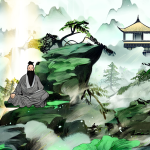
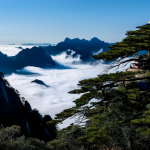
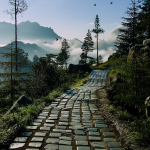


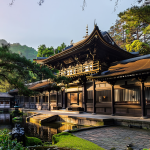
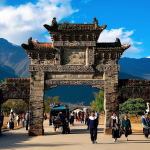

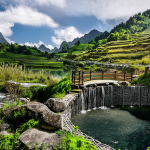
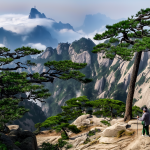
评论功能已关闭。